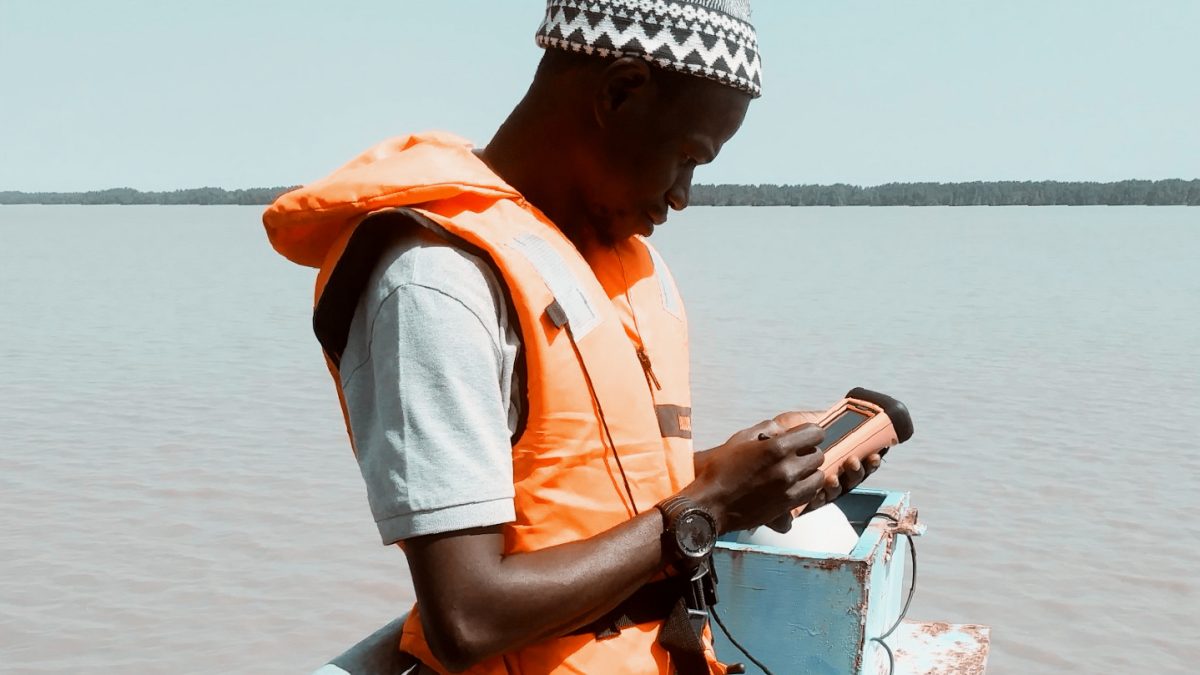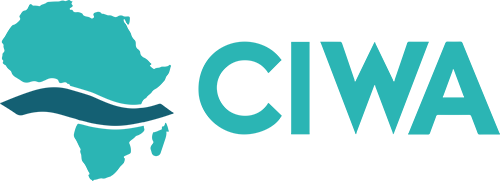Protecting groundwater from depletion in the SMAB
Posted in : A View From The Field on 5 May 2025

Landing Bojang collecting and monitoring water data in the Senegal-Mauritanian Aquifer Basin. ©Landing Bojang
Landing Bojang is worried.
“If you have excessive groundwater withdrawal to below the level of the river,” says Bojang, “the river will dry up, which would be catastrophic for ecosystems and biodiversity and all the services they provide.” Bojang, the chief hydrologist of The Gambia’s Department of Water Resources in the Ministry of Fisheries, Water Resources, and National Assembly Matters, adds, “This is how critical the basin is.”
The basin he is focused on is the Senegal-Mauritanian Aquifer Basin (SMAB), which is shared by The Gambia, Guinea Bissau, Mauritania, and Senegal. CIWA is supporting the creation of a roadmap for the development of a joint vision and program to establish long-term cooperation on the SMAB, which is expected to ultimately lead to a charter governing its management.
“Excessive groundwater abstraction is already a concern,” Bojang says. “The main problem is that we are not tracking data for groundwater withdrawal.
We are falling short of our obligations on the Sustainable Development Goals, especially indicator 6.4.2, which aims to ensure sustainable withdrawals and supply of freshwater to address water scarcity and water stress,” he says. “We do not have information on which sectors are using the water—whether for domestic use or commercial, industrial, or agricultural purposes.”
Safeguarding groundwater so countries can develop
Bojang, 40, believes passionately in the importance of water resources and their contribution to socioeconomic development for his country, which led him to major in hydrology in college.
He received his BSc degree in hydrology and water resources engineering in 2013 from Hohai University in Nanjing, China and his MSc degree in water resources management in 2018 from the IHE Delft Institute for Water Education in the Netherlands.
“Water is fundamental for socioeconomic development, so access to water is pivotal,” he says. “The groundwater that lies below our feet is such a crucial resource, and it can supply water to remote communities with less investment. It sustains the ecosystem and keeps the river flowing because there is connectivity.”
And, he says, because the SMAB intersects with the Gambia River Basin and the Senegal River Basin, “it is even more critical.
“With the looming crisis of climate change, there will be increased salinization of rivers, which also affects groundwater and will accelerate saltwater intrusion into coastal aquifers.”
Moreover, Bojang says, he’s very concerned about the effects of pollution and inadequate sanitation services on the quality of water resources. “We need effective policies to regulate sanitation to avert groundwater pollution” coupled with awareness raising among the communities, he says.
For example, he says that some people place impermeable materials such as concrete tiles on the ground in public spaces such as family compounds, which prevents rainfall from recharging groundwater.
“We need public sensitization, laws, regulations, and institutional capacity to be able to manage and govern the groundwater,” he says.
A game-changer for the region
For the last four years, Bojang has been a member of the Regional Working Group (RWG) focused on achieving a SMAB cooperation agreement signed by all four countries. The RWG is housed at the SMAB Secretariat that was created by the two regional River Basin Organizations (RBOs)—Senegal River Basin Development Authority (OMVS), which includes Mali, Mauritania, Guinea, and Senegal, and the Gambia River Development Organization (OMVG), which includes The Gambia, Guinea, Guinea-Bissau, and Senegal. The Sahara and Sahel Observatory is also an RWG member, while Guinea and Mali have observer status.
Bojang says the RWG has accomplished a lot, including the production of knowledge reports about the recharge extent of the aquifer; reviews of different aquifer management systems; and examinations of institutional capacity, data availability, and data sharing protocols.
Not surprisingly, cooperation has not always come easily. It took some time, for example, for basin countries to agree on the staffing of the Secretariat. “Everyone wanted a fair share of the benefits of the cooperation—this is human nature,” he says. But the Regional Working Group persevered and the high commissioners of the two RBOs signed an operating protocol in October 2023.
In addition to the Cooperation international Waters in Africa (CIWA Program), the work of the RWG has been facilitated by the Geneva Water Hub, the Secretariat of the Water Convention serviced by the Economic Commission of the United Nations for Europe, and the International Groundwater Resources Assessment Center. The European Union, the Swiss Agency for Development and Cooperation, the United Nations Environment Program (UNEP), the Italian Agency for Development Cooperation, and UNESCO are also financing projects.
Bojang says he is grateful for CIWA’s support to assess the capacity of member states and the two RBOs for managing the SMAB and to develop the institutional framework for aquifer management.
“We are so excited to have this support from the World Bank so that we can improve groundwater management and sustainability,” Bojang says. “It is our future and the future of generations to come. We cannot afford to lose this groundwater to pollution or to overexploitation. We need to stop the depletion of this aquifer. With World Bank support, it’s a game changer for the region.”


